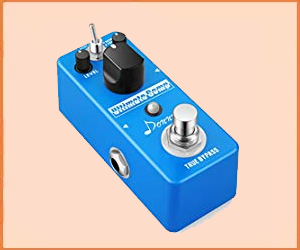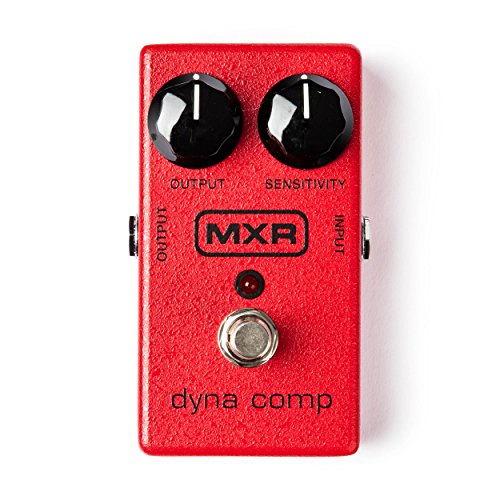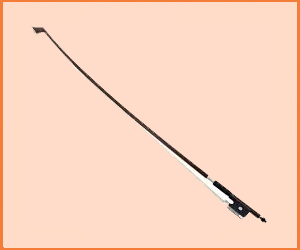
There are few things that separate the beginners from the legends and a compressor pedal is one of them.
Once you play your electric guitar (Even if you’re using a wireless guitar system) or an acoustic-electric guitar with a compressor on (Like pretty much all professionals do), you wouldn’t dream of going back. It’s just as fun as an overdrive pedal.
What does a compressor pedal do?
For my fellow music producers out there, if you understand what compression is, you probably get the gist of it already.
If your guitar is too loud, a compressor pedal will even out the ‘peaks’. If the tones produced by your guitar are too “soft”, a compressor will raise the ‘super low’ peaks and bring it up.
Ultimate Comp by Donner
- 【Advanced Compressor Pedal】Donner’s comprehensive pedal can smoothen out dynamics between the high and low...
- 【Versatile Functions】Our Ultimate Comp features an easy-to-use tone control: COMP (compression intensity), TONE...
- 【Two Practical Modes】The guitar compressor pedal also offers a mode selector switch of NORMAL and TREBLE. Signal can...
This Donner compressor pedal is simple and to the point. You plug it in, set it up (On your pedal board would be the ideal spot), use the compressor knob to adjust how you want things to sound and off you go.
Most guitar players really enjoy this as it will definitely give you that ‘clean’ professional sound. Some also report that it’s just the volume that goes up and it doesn’t really compress. I personally doubt that or it wouldn’t be in the market anyways but we like to take all opinions in consideration here.
Overall though, if this is your first time, the Ultimate Comp by Donner seems to be a good compressor pedal.
MXR M102 by Donner – Best Compressor Pedal
- In-line compressor “evens out” the signal to your amplifier
- Useful for increased sustain with stable dynamics
- Nashville studio standard
If you get off on using the gear the professionals use, this compressor pedal is for you. The MXR is one of the most popular compressor pedals out there. Just like Yamaha is THE brand for acoustic guitars, Donner or to be more specific, the MXR M102 model is one of the most used guitar compressors ever made.
This little wonder will make your guitar sounds fuller, thicker and just cleaner than before. The MXR works great on most guitars but if you have a humbucker pickup, it might not be the best choice.
What is a Humbucker Pickup?
As discussed in our DIY guitar section, a humbucker is a type of guitar pickup. A guitar pickup is what helps produce the guitar’s sound. For someone reason or other, the MXR M102 doesn’t work that well with electric guitars that have the humbucker style of pickup. If you have one of those, then it’s best to avoid this one.
JOYO JF-10 by JOYO
- Guitar Effect Pedal
- Dynamic Compressor
- Profession Guitar AMP and Effect Pedal
Don’t let the small size fool you, the JF-10 packs quite a punch as a compressor pedal. Some say this Joyo compressor pedal might be a clone of the old school Ross compressor or a decent copy of the Crunchbox by MI Audio. Well call it what you want, a lot of people find the JF-10 compressor quite useful.
If you’re a bass guitarist, then you’ll appreciate this compressor even more.
Xotic SP by Xotic
- Compress Pedal with Compact Size
- Controls f Compression Amount
- Volume
Considered the best overall guitar compressor in the market, the Xotic SP can help you create that professional guitar sound on the lowest compressor setting.
Perfect for adding those extra harmonics and it really helps brighten up the sustain as well. This Xotic compressor pedal is highly recommended for beginners, intermediates and professionals alike. Some even consider it better than the more higher end Keely (Usually the professional players use this one).
Boss CS-3 Compressor / Sustainer Pedal by Boss Audio Systems
- Compression/Sustainer Pedal f Guitar
- Guitar Pedal
- Low-noise design for super-quiet operation
Another popular choice but it really depends on who you talk to. Some absolutely love the tone the Boss CS 3 guitar compressor pedal produces and some just plain dislike it (Especially if you are into metal). Background noise seems to be a common issue as well.
Unfortunately, it’s one of those guitar pedals that you don’t know until you try it (Depends on your personal preference really) but overall, most users do enjoy it.
When it comes to the Boss CS-3, you either hate it or love it.
Wampler Mini Ego Compressor by Wampler
- Brings a new level of of control to what is expected and needed by today's guitar players, all in a mini format
- Based on our original Ego but featuring switches for tone (dark and bright) and attack (slow and fast)
- Allows your original signal to be blended in so you can get all the benefits of a great compressor but with the option...
The mini ego is known as the true guitarist’s pedal. Most report enjoying super clean tones which are maintained when you hit sustain as well. Also notes in the 500hz and above category are nicely brought to life as well.
The main reason though why people like the Wampler Mini Ego is because it’s one of those few pedals out there that actually increases the velocity of your tone but still maintains it’s tone.
On the downside, some do experience background noise with this. For what it’s worth, this happens to be the first Wampler compressor pedal for a lot of beginners.
MXR M132 by MXR
- An update of the legendary Dyna Comp
- Attack level control preserves initial volume without sacrificing sustain
- The ultimate source for the “Nashville” sound
If sustain is your game the M132 by MXR is a popular choice. Decent overall compressor that actually has quite a bit of history in the guitar world.
A lot of acoustic guitar players once they switched to electric, were introduced to the MXR. In fact the MXR brand has been the very ‘first’ compressor for a lot of beginner guitar players. A few complain that this MXR compressor pedal creates ‘muddy’ tones.
Behringer CS400 by Behringer
- Compress/Sustainer Pedal with Level
- Sustain Controls
- Attack
I’m personally a big fan of the Behringer brand. I think they’ve done so much for us beginner and home music producers. Even my audio interface is by Behringer. The CS400 maintains that reputation and it doesn’t disappoint. I’m assuming the price is where it’s at because Behringer is trying to make it’s mark in the guitar pedal market but don’t let it foo you.
This is one quality guitar Behringer compressor pedal and the people have spoken. A generally noise free pedal that truly brings out the tone of your guitar. The pedal is surprisingly good at evening out your sound and giving you that professional guitar sound.
Some more experience players though report hearing extra notes every now and then or as we call them in the industry ‘ghost notes’.
I know beginners would love this but not sure about the more experienced players. Regardless, good job Behringer.
Once again you didn’t disappoint.
TC Electronic Hypergravity Mini Compressor by TC Electronic
- Hypergravity mini compressor is the one thing missing from your pedalboard that will take your tone from good – to...
This guitar pedal is used by intermediate guitarists and professionals for a reason . . . it produces really rich tones. The TC Electronic Hypergravity Mini Compressor is quite a favorite for most guitarists but with some drawbacks.
A common one is the ‘noise’ factor. Although you can try eliminating the noise by turning off the gain and adjusting it further, it’s really meant for someone who has had some experience with guitar compressor pedals before.
Think of this TC Electronic compressor pedal as an advanced synthesizer. You can make great beats with it but to really unlock it’s potential, going through a little learning curve or previous knowledge may be required.
Anatomy of a compressor pedal
A fairly straightforward piece of equipment, the compressor pedal is easy to connect and ready for use almost right away.
Since most compressors come with their own unique features, there isn’t no ‘standard’ by which a compressor pedal is judged.
One thing you will find on all compressors though is a input and output jack.

Input
This is where you connect your guitar too. Sometimes you can connect other types of pedals here as well.
Output
This is the part that helps you connect to your amplifier.
As far as output, sensitivity, tone, etc are all just special features that each compressor pedal comes with or not.
Depending on the brand or model of course.
Generally speaking, one thing they all do is ‘compress’ the sound that your guitar produces in their own unique way.
Best Compressor Pedal Brands
As someone who is interested in a compressor pedal, you sure are in luck. There are so many quality compressor pedal brands out there that it’s not even funny. Best part, you are bound to find a compressor pedal that’s right for you.
Here I showcase these specific brands.
Donner
Only 6 years old and already pretty much leading the pack. Donner has come out with some quality yet funky designs that have taken off in the guitar compressor pedal market.
Think of the Donner guys as the future ‘Apple’ of compressor pedals. I said future because I feel like they still have to prove themselves a little bit more but overall they are getting there pretty fast. Definitely recommend these guys.
Joyo
The Joyo team makes a lot of guitar related accessories and compressor pedals just happens to be one of them.
They’ve already made a decent name for themselves in the guitar amp and tuner market but and have quickly established a respectable presence in the guitar pedal industry as well.
Xotic
Hailing from the Westcoast (Southern California), the Xotic brand has been making pedalboards for the past 20 years. Yes they’ve been around the block a few times and then some. After creating the Robotalk, an innovative pedal, the company has not looked back since. Xotic is constantly innovating and creating wonderful products for the guitar enthusiast market.
Boss Audio Systems
Not to be confused with Bose, Bose Audio specializes in marine audio, mobile audio and a bunch of other similar categories. It’s nice to see a company with such massive experience in the audio field, bring their expertise to the world of pedal compressors. Don’t worry guys, they’ve been around for 30 years, they know what they are doing.
Wampler Pedals
Now this is what I call dedication. These guys have been making pedals since the beginning and that’s all they do. They are proudly made in the USA and Some serious artists support them. Wampler is one of those rare American brands that is still putting out quality products.
Behringer
I think if you spent some time on this site, you would figure out that I’m a big fan of the Behringer brand. I love their audio interface (Which I currently own) and I am very impressed with how they do things year after year. Same thing with their compressor pedals. Quality stuff all around. Enjoy the German inspired engineering guys.
MXR Innovations
Just like Wampler, Here comes another homegrown made in the USA brand that has been making amazing guitar pedals since 1972. If you’ve been in the game for 50 years then you don’t need to worry about a thing. Enjoy their groundbreaking pedals. Trust me, when their quality goes down, we’ll be the first to jump on it.
The idea of compression is to make everything more balanced and even. This makes the sound a lot more pleasant than before. This concept of compression is used literally everywhere in the music world.
Heck even when mixing drums sometimes.
Here is an example of a “before” compression and “after” compression of an audio file.

See how everything is more ‘balanced’ in the after picture? That’s what compression does.
Do I need a compressor pedal?
Well here is a guitar riff BEFORE using a compressor pedal:
Here is the AFTER result:
Notice the sound?
Which sounds more balanced and professional?
Exactly :). The “after” one sounds cleaner, smoother, etc (Just in case you didn’t pick that up).
If you listen to these samples on a set of professional studio monitors, you’ll really feel the difference.
A nice way to sum it up is a compressor pedal will bring your current guitar sound to life.
A lot of guitar players love using it on the ‘sustain’ as well (I’m referring to ADSR in music-making by the way).
That’s why literally every guitar that you hear on TV, background music on Netflix or wherever professional music is played, has some sort of compression on it.
Bottom line, if you want that professional guitar sound, get a compressor pedal. Whether you are using a real guitar or even while creating midi notes through a keyboard or a midi guitar controller, compression usually improves the sound quality.
Table of Contents











![[Cover] Music Production Desk](https://www.techlifeland.com/wp-content/uploads/2017/07/Cover-Music-Production-Desk.jpg)